英语中虚拟语气
(完整版)英语虚拟语气语法归纳总结
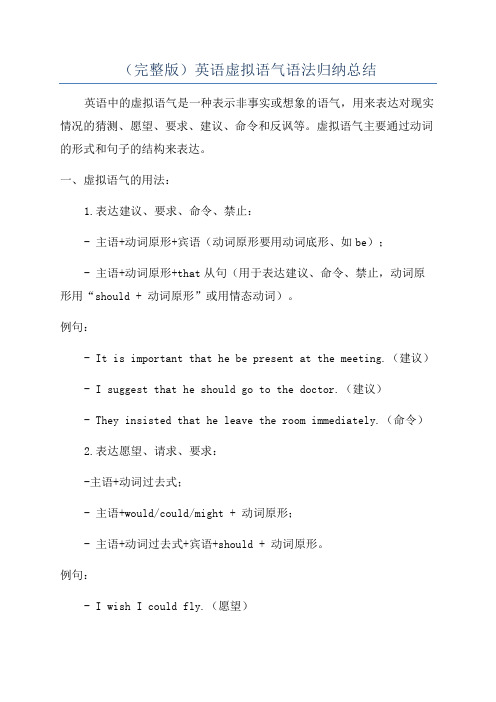
(完整版)英语虚拟语气语法归纳总结英语中的虚拟语气是一种表示非事实或想象的语气,用来表达对现实情况的猜测、愿望、要求、建议、命令和反讽等。
虚拟语气主要通过动词的形式和句子的结构来表达。
一、虚拟语气的用法:1.表达建议、要求、命令、禁止:- 主语+动词原形+宾语(动词原形要用动词底形、如be);- 主语+动词原形+that从句(用于表达建议、命令、禁止,动词原形用“should + 动词原形”或用情态动词)。
例句:- It is important that he be present at the meeting.(建议)- I suggest that he should go to the doctor.(建议)- They insisted that he leave the room immediately.(命令)2.表达愿望、请求、要求:-主语+动词过去式;- 主语+would/could/might + 动词原形;- 主语+动词过去式+宾语+should + 动词原形。
例句:- I wish I could fly.(愿望)- I would appreciate it if you could help me.(请求)3.表示虚拟条件:- If条件从句中的谓语动词用过去完成时,主句用would/should/might/could + have + 过去分词;- If条件从句中的谓语动词用过去时,主句用would/should/could + 动词原形。
例句:- If I had known his phone number, I would have called him.(虚拟条件)- If you had listened to me, we could have finished the project earlier.(虚拟条件)4.表达建议、要求、祝愿:- If only内部称述 + 主语 + 过去式。
英语中三种虚拟语气
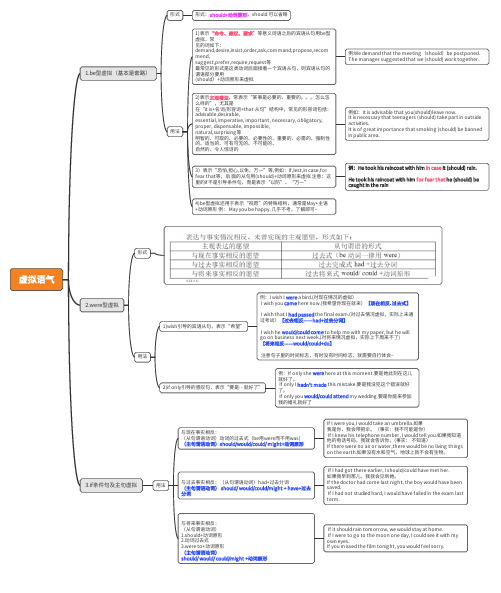
虚拟语⽓1.b e型虚拟(基本是套路)2.w ere型虚拟3.if条件句及主句虚拟形式⽤法⽤法1)表⽰“命令、建议、要求”等意义词语之后的宾语从句⽤b e型虚拟,常⻅的词如下:d e m an d,d es i re,i ns i s t,or d er,as k,co mm an d,p ro p ose,reco mm en d,sugges t,p re f er,re q u i re,re q ues t等最常⻅的形式是这类动词后⾯接着一个宾语从句,则宾语从句的谓语部分要⽤(s h oul d)+动词原形来虚拟2)表⽰主观看法,常表⽰“某事是必要的、重要的。
怎么怎么样的”,尤其是在“it i s+名词/形容词+th a t 从句”结构中,常⻅的形容词包括:a dvi sab le,d es i ra b le,essen ti al, imp era tiv e, imp or t an t, necessar y, o b l i ga t or y,p ro p er, di s p ensa b le, imp oss ib le,na t ural,sur p r i s i ng等明智的、可取的、必要的、必要性的、重要的、必需的、强制性的、适当的、可有可⽆的、不可能的、⾃然的、令⼈惊讶的3)表⽰“恐怕,担⼼,以免,万一”等,例如:if,les t,i n case,f orf ear th a t等,后 ⾯的从句⽤(s h oul d)+动词原形来虚拟 注意:这⾥的if不是引导条件句,⽽是表⽰“以防”、“万一”4)b e型虚拟还⽤于表⽰“祝愿”的特殊结构,通常是M a y+主语+动词原形 例: M a y y ou b e h a ppy. ⼏乎不考,了解即可~与现在事实相反:(从句谓语动词)动词的过去式(b e⽤w ere⽽不⽤w as)(主句谓语动词)s h oul d/w oul d/coul d/ mi g ht+动词原形与过去事实相反:(从句谓语动词)h a d+过去分词(主句谓语动词) s h oul d/ w oul d/coul d/mi g ht + h a v e+过去分词与将来事实相反:(从句谓语动词)1.s h oul d+动词原形2.动词过去式3.w ere t o+动词原形(主句谓语动词)s h oul d/ w oul d/ coul d/mi g ht +动词原形形式:s h oul d+动词原形,s h oul d 可以省略If it s h oul d ra i n t o m orro w, w e w oul d s t a y a t h o m e.If I w ere t o go t o th e m oon one d a y, I coul d see it with myo w n e y es.If y ou mi sse d th e fi l m t on i g ht, y ou w oul d f eel sorr y.If I h a d go t th ere earl i er, I s h oul d/coul d h a v e m e t h er.如果我早到那⼉,我就会⻅到她。
英语中的虚拟语气构成和用法
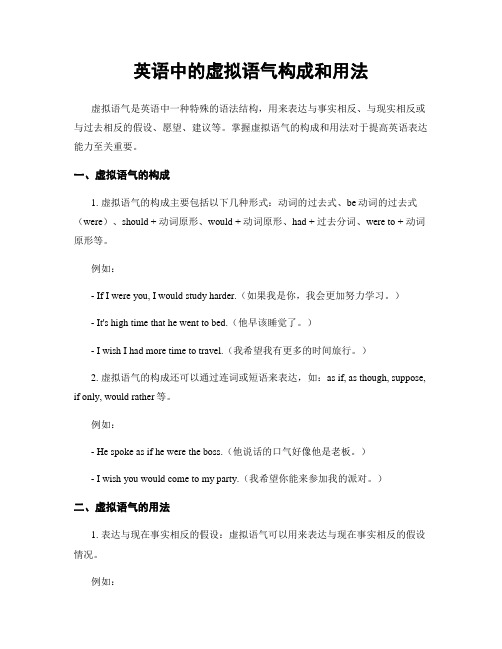
英语中的虚拟语气构成和用法虚拟语气是英语中一种特殊的语法结构,用来表达与事实相反、与现实相反或与过去相反的假设、愿望、建议等。
掌握虚拟语气的构成和用法对于提高英语表达能力至关重要。
一、虚拟语气的构成1. 虚拟语气的构成主要包括以下几种形式:动词的过去式、be动词的过去式(were)、should + 动词原形、would + 动词原形、had + 过去分词、were to + 动词原形等。
例如:- If I were you, I would study harder.(如果我是你,我会更加努力学习。
)- It's high time that he went to bed.(他早该睡觉了。
)- I wish I had more time to travel.(我希望我有更多的时间旅行。
)2. 虚拟语气的构成还可以通过连词或短语来表达,如:as if, as though, suppose, if only, would rather等。
例如:- He spoke as if he were the boss.(他说话的口气好像他是老板。
)- I wish you would come to my party.(我希望你能来参加我的派对。
)二、虚拟语气的用法1. 表达与现在事实相反的假设:虚拟语气可以用来表达与现在事实相反的假设情况。
例如:- If I were you, I would quit that job.(如果我是你,我会辞掉那份工作。
)- I wish I had more money.(我希望我有更多的钱。
)2. 表达与过去事实相反的假设:虚拟语气可以用来表达与过去事实相反的假设情况。
例如:- If I had studied harder, I would have passed the exam.(如果我学得更努力,我就能通过考试了。
)- I wish I had known about the party earlier.(我希望我早点知道这个派对。
英语虚拟语气
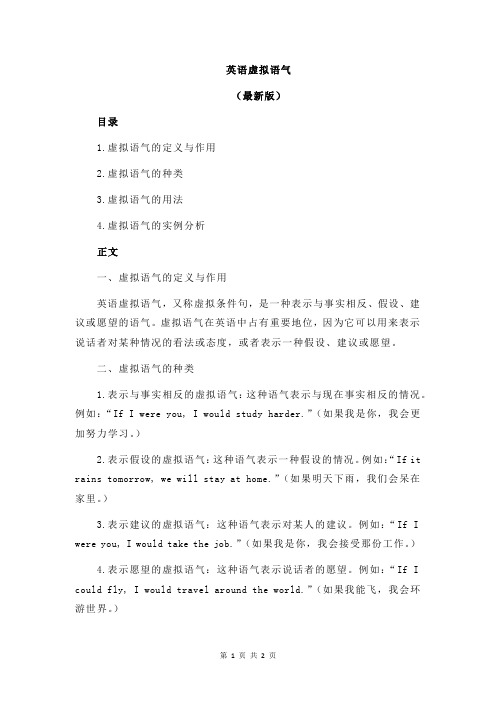
英语虚拟语气(最新版)目录1.虚拟语气的定义与作用2.虚拟语气的种类3.虚拟语气的用法4.虚拟语气的实例分析正文一、虚拟语气的定义与作用英语虚拟语气,又称虚拟条件句,是一种表示与事实相反、假设、建议或愿望的语气。
虚拟语气在英语中占有重要地位,因为它可以用来表示说话者对某种情况的看法或态度,或者表示一种假设、建议或愿望。
二、虚拟语气的种类1.表示与事实相反的虚拟语气:这种语气表示与现在事实相反的情况。
例如:“If I were you, I would study harder.”(如果我是你,我会更加努力学习。
)2.表示假设的虚拟语气:这种语气表示一种假设的情况。
例如:“If it rains tomorrow, we will stay at home.”(如果明天下雨,我们会呆在家里。
)3.表示建议的虚拟语气:这种语气表示对某人的建议。
例如:“If I were you, I would take the job.”(如果我是你,我会接受那份工作。
)4.表示愿望的虚拟语气:这种语气表示说话者的愿望。
例如:“If I could fly, I would travel around the world.”(如果我能飞,我会环游世界。
)三、虚拟语气的用法虚拟语气的用法主要取决于句子的时态、主语和从句的语境。
在虚拟语气中,动词的形式取决于表示的语气,一般有以下几种形式:1.表示与事实相反的虚拟语气:be 动词用 were;其他动词用过去式(be 动词用 were)。
2.表示假设、建议或愿望的虚拟语气:be 动词用情态动词 + 动词原形的形式;其他动词用情态动词 + 过去分词的形式。
四、虚拟语气的实例分析1.表示与事实相反的虚拟语气:例如:“If I were rich, I would buy a luxury car.”(如果我是个富人,我会买一辆豪华车。
)2.表示假设的虚拟语气:例如:“If he had time, he would go to the party.”(如果他有时间,他会参加派对。
英语虚拟语气

英语虚拟语气摘要:一、英语虚拟语气的概念与分类1.定义2.分类二、英语虚拟语气的用法1.表示与现在事实相反的假设2.表示与过去事实相反的假设3.表示对未来事实的虚拟4.表示愿望、建议、命令等三、虚拟语气在各种从句中的应用1.名词性从句2.状语从句3.定语从句四、虚拟语气与其他语气的区别1.与条件语气的区别2.与推测语气的区别五、虚拟语气的注意事项1.形式的变化2.语气的转换3.语境的理解正文:一、英语虚拟语气的概念与分类1.定义英语虚拟语气(Subjunctive Mood)是一种表示说话者对某个动作或情况的真实性、可能性或期望的语气。
它用于表示与事实相反的假设、愿望、建议等。
2.分类根据用途和时态,英语虚拟语气可分为三类:(1)与现在事实相反的虚拟语气,如:If I were you,I would accept the job.(2)与过去事实相反的虚拟语气,如:If he had known the truth,he would have helped me.(3)表示对未来事实的虚拟,如:If it rains tomorrow,we will stay at home.二、英语虚拟语气的用法1.表示与现在事实相反的假设虚拟语气用于表示与现在事实相反的假设,如:If I were you,I would accept the job.2.表示与过去事实相反的假设虚拟语气用于表示与过去事实相反的假设,如:If he had known the truth,he would have helped me.3.表示对未来事实的虚拟虚拟语气用于表示对未来事实的虚拟,如:If it rains tomorrow,we will stay at home.4.表示愿望、建议、命令等虚拟语气可用于表示愿望、建议、命令等,如:I wish he would come to our party.三、虚拟语气在各种从句中的应用1.名词性从句在名词性从句中,如主语从句、宾语从句和表语从句,可以使用虚拟语气,如:What if I tell you that we can succeed?2.状语从句在表示条件、原因、目的等状语从句中,可以使用虚拟语气,如:If I were you,I would accept the job.3.定语从句在定语从句中,如用虚拟语气修饰的名词性从句,如:The man who would win the competition was my brother.四、虚拟语气与其他语气的区别1.与条件语气的区别虚拟语气与条件语气都表示假设,但虚拟语气更注重对事实的虚拟,而条件语气关注条件与结果之间的关系。
英语中的虚拟语气表达
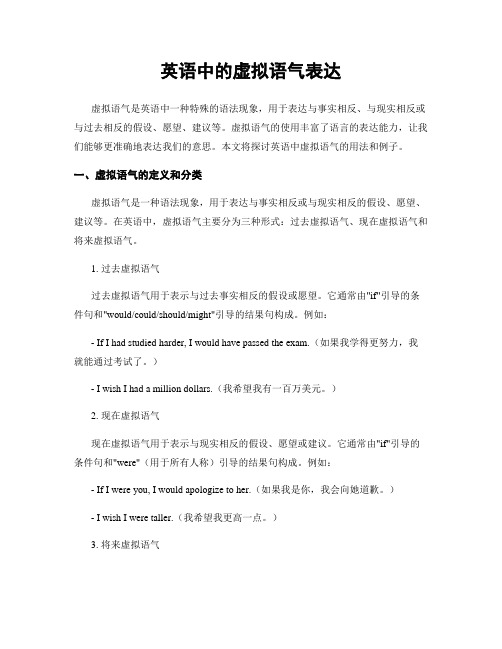
英语中的虚拟语气表达虚拟语气是英语中一种特殊的语法现象,用于表达与事实相反、与现实相反或与过去相反的假设、愿望、建议等。
虚拟语气的使用丰富了语言的表达能力,让我们能够更准确地表达我们的意思。
本文将探讨英语中虚拟语气的用法和例子。
一、虚拟语气的定义和分类虚拟语气是一种语法现象,用于表达与事实相反或与现实相反的假设、愿望、建议等。
在英语中,虚拟语气主要分为三种形式:过去虚拟语气、现在虚拟语气和将来虚拟语气。
1. 过去虚拟语气过去虚拟语气用于表示与过去事实相反的假设或愿望。
它通常由"if"引导的条件句和"would/could/should/might"引导的结果句构成。
例如:- If I had studied harder, I would have passed the exam.(如果我学得更努力,我就能通过考试了。
)- I wish I had a million dollars.(我希望我有一百万美元。
)2. 现在虚拟语气现在虚拟语气用于表示与现实相反的假设、愿望或建议。
它通常由"if"引导的条件句和"were"(用于所有人称)引导的结果句构成。
例如:- If I were you, I would apologize to her.(如果我是你,我会向她道歉。
)- I wish I were taller.(我希望我更高一点。
)3. 将来虚拟语气将来虚拟语气用于表示与将来事实相反的假设或愿望。
它通常由"if"引导的条件句和"would/could/should/might"引导的结果句构成。
例如:- If it rained tomorrow, we would stay at home.(如果明天下雨,我们会呆在家里。
)- I hope she would come to the party.(我希望她能来参加派对。
英语语法之虚拟语气

虚拟语气知识要点一、语气是动词的一种形式,它表示说话人对某一行为或事情的看法和态度。
英语中有三种语气:1.述语气:表示谓语动词表示的动作/状态符合客观现实。
2.祁使语气:表示号召、命令、建议、劝告、警告、禁止等。
3. 虚拟语气:表示动作/状态不是客观现实,而是愿望、假设、推测等。
二、虚拟语气的构成例:○与将来的事实相反:1.If Professor Li should have time tomorrow, wecould ask him some questions.2.If there should be no air, there would be no livingthings.3.If it wereto snow tomorrow, they couldn’t goout. ○与现在的事实相反:1. If it rained now, I wouldnotgo shopping.2. If I were a teacher, I wouldbe strict with my students.3. If it werenot for their help, we shouldbe in a verydifficult position.○与过去的事实相反:1. If I hadcome yesterday, I wouldhaveseen him.2. If we hadstarted earlier, we shouldnothavemissedthe train.3. If she hadn’tbeen ill, she mighthavecome.***请注意三种特殊情况:○上面的句子大多都可以改成倒装句,这时If就省略了,同学们要能识别出来。
如:1. Should there be no air, there wouldbe no living things.2. Were it not for their help, we shouldbe in a verydifficult position.3. Had she not been ill, she mighthavecome.○错综时间条件句。
英语中虚拟语气用法总结
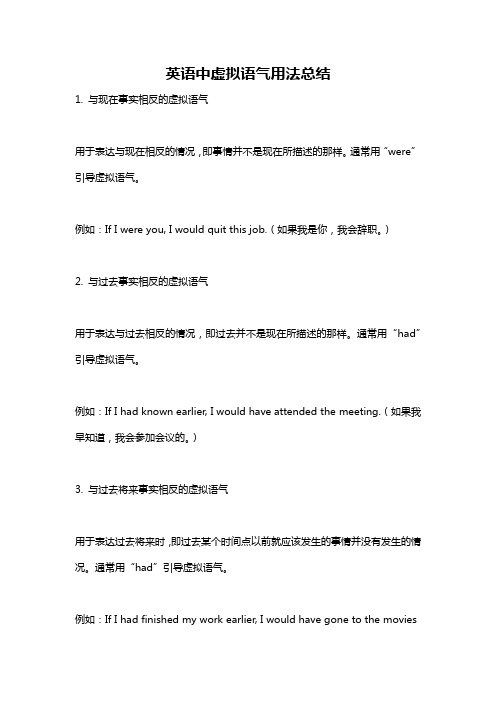
英语中虚拟语气用法总结1. 与现在事实相反的虚拟语气用于表达与现在相反的情况,即事情并不是现在所描述的那样。
通常用“were”引导虚拟语气。
例如:If I were you, I would quit this job.(如果我是你,我会辞职。
)2. 与过去事实相反的虚拟语气用于表达与过去相反的情况,即过去并不是现在所描述的那样。
通常用“had”引导虚拟语气。
例如:If I had known earlier, I would have attended the meeting.(如果我早知道,我会参加会议的。
)3. 与过去将来事实相反的虚拟语气用于表达过去将来时,即过去某个时间点以前就应该发生的事情并没有发生的情况。
通常用“had”引导虚拟语气。
例如:If I had finished my work earlier, I would have gone to the movieswith my friends.(如果我早点完成工作,我会和朋友去看电影的。
)4. 与现在将来可能性相反的虚拟语气用于表达现在将来的可能性,即可能会发生但不太可能的情况。
通常用“should”或“were to”引导虚拟语气。
例如:If I were to win the lottery, I would travel around the world.(如果我中了彩票,我会周游世界的。
)5. 与过去将来可能性相反的虚拟语气用于表达过去将来的可能性,即曾经可能会发生但最终却没发生的情况。
通常用“should”或“were to”引导虚拟语气。
例如:If I should fail the exam, I would have to retake it in three months.(如果我考试不及格,我就得三个月后再次参加考试。
)。
- 1、下载文档前请自行甄别文档内容的完整性,平台不提供额外的编辑、内容补充、找答案等附加服务。
- 2、"仅部分预览"的文档,不可在线预览部分如存在完整性等问题,可反馈申请退款(可完整预览的文档不适用该条件!)。
- 3、如文档侵犯您的权益,请联系客服反馈,我们会尽快为您处理(人工客服工作时间:9:00-18:30)。
虚拟语气英语中的语气分为陈述语气、祈使语气、虚拟语气三类。
虚拟语气表示说话人的主观愿望或假想,所说的是一个条件,不一定是事实,或与事实相反。
条件句可分为两类,一类为真实条件句,一类为非真实条件句。
非真实条件句表示的是假设的或实际可能性不大的情况,故采用虚拟语气。
如果假设的情况可能发生,是真实条件句,这种情况下谓语用陈述语气。
如:If time permits, we'll go fishing together.如果时间允许,我们就一起去钓鱼。
如果假设的情况是不存在的或不大可能发生的,则是虚拟条件句。
如:If you had come yesterday, you would have met that famous professor.如果你昨天来,你就会见到那位著名的教授了。
(隐含的事实是:你昨天没来,也没见到那位著名教授)。
虚拟语气的基本形式和用法在含有虚拟条件句的复合句中,主从句的谓语都要用虚拟语气。
1. 含有条件状语从句的复合句wish(would rather)+宾语从句suggest(…)+宾语从句2. 主语从句 It is + adj./p.p/n.+ that+ S+ (should) +do表语从句S+is that +s + (should) +do同位语从句 S+that +s +(should) +do3. 定语从句 It is (high) time that + S + did用过去式表现在情况1. 时态后退型用过去完成式表过去两种形式用过去将来表将来2. should+动词原形型内容详述I. 含有条件状语从句的复合句(以do为例;S=主语)时间条件状语从句主句与现在事实相反的假设 If +S+did…S+would/should/could/might+do…与过去事实相反的假设 If +S+had done… S+would/should/could/might+have done…与将来事实相反的假设did…If+S should dowere to doS+would/should/could/might+do…注意事项:1.倒装句。
如果条件句中含有功能词had,should,were时,可以省去If,把功能词提前,构成倒装句。
2.错综条件句。
若条件句和主句动作不存在同一个时间,则谓语形式应根据具体情况而定。
3.If there weren't/had not been +…=without…4.If it were not for…/ If it hadn't been for…= but for…5.otherwise+虚拟语气的句子6.虚拟语气的句子,but+ 陈述事实的句子II. 虚拟语气用在宾语从句中sb. did …(希望现在用过去式)1. wish+that sb. had done…(希望过去用过去完成式)sb. would/should do(希望将来用过去将来)2. would rather后的从句要用虚拟语气。
时间从句虚拟现在 were, did (动词一般过去式)虚拟过去 had done虚拟将来 did (动词一般过去式)例:I would rather I hadn’t said such unkind things to you. (虚拟过去)I'd rather you came here for the answer tomorrow morning. (虚拟将来)I’d rather you posted the letter right away. (虚拟现在)3. suggest+(that)S+should+do…表示愿望、建议、请求等主观意向的动词之后的宾语从句,谓语用should +动词原形,should 常常省略。
这类词有:decide,demand,desire,insist,order,propose,suggest,recommend,requested, require 等。
注意:1. suggest 当“建议”讲时,其宾语从句用虚拟语气;当“暗示、表明”时,用陈述语气2. insist 当坚持“看法或建议”时,宾语从句用虚拟语气;当坚持“某个事实”时,用陈述语气。
判断改错:(错) Your pale face suggests that you(should)be ill.(对) Your pale face suggests that you are ill.(错) I insisted that you(should)be wrong.(对) I insisted that you were wrong.III. 虚拟语气用在主语从句中It is demanded / necessary / a pity + that…等结构的主语从句,谓语动词用should 加动词原形,should 可省略。
It is 可用的词有三类 that (should)dosuggested, ordered, required, proposed, demanded, requested, insisted等important, necessary, natural, imperative, strange等a pity, a shame, no wonder等IV.虚拟语气用在同位语从句中。
某些表示建议、请求、命令等主观意向的名词后同位语从句需用虚拟语气,其表达形式为(should) +动词原形。
这类名词常见的有:advice,suggestion,proposal(提议),order, demand,desire,request,requirement,recommendation(推荐),plan,resolution(决议), idea等。
eg. We are all for your proposal that the discussion ( should )be put off.V.虚拟语气用在表语从句中。
某些表示建议、请求、命令等主观意向的名词作主语时,表语从句需用虚拟语气,其表达形式为(should) +动词原形。
这类名词常见的有:advice,suggestion,proposal,order, demand,desire,request,requirement,recommendation以及plan,idea,resolution等。
eg. My suggestion is that the mayor (should)present the prizes.VI.虚拟语气用在定语从句中It is(about /high)time +that sb.did sth/should do sth..eg. Don't you think it's about time we went home?注:在this is the first time /second time that...句型中,从句中谓语动词用陈述语气完成时态。
eg.Is this the first time that you have visited Hongkong?VII. 虚拟语气用在让步、方式、目的状语从句中1.在带有even if/ even though引导的让步状语从句的主从复合句中,主句和从句都用虚拟语气,动词形式与含有非真实条件句的虚拟语气相同。
如: Even if he had been ill, he would have gone to his office. 即使生了病,他俩去办公室。
2.由as if或as though引导的状语从句表示比较或方式时。
从句谓语形式为动词的过去式(be 用were)或“had十过去分词”。
如: He treated me as if I were a stranger. 他那样对待我,好像我是陌生人似的。
She talked about the film as if she had really seen it. 她谈论那部影片,就好像她确实看过一样。
3.虚拟语气用在lest(唯恐、免得),for fear that及in case引导的目的状语从句中。
在由lest 等引导的目的状语从句中需用虚拟语气,表示“以防,以免”等意思,其谓语动词多由should +动词原形构成,should也可省略。
eg. He was punished lest he should make the same mistake again.VIII.虚拟语气用情感语言中1.虚拟语气在表示客气、遗憾以及祝愿等场合中,使用虚拟语气。
eg.You shouldn't have been following him so closely;you should have kept your distance.2.If only sb./sth. +时态后退型的谓语eg. If only I had known the result of the examination.IX.虚拟语气的特殊用法:1. 省掉if的条件从句结构:Had you asked me, I would have told you.(=If you had asked me,…)2.有时虚拟条件不用条件从句而用不定式、分词、介词、名词、连接词或定语从句来表示,如:A true friend would not do such a thing.(=If he were a true friend, he would...)3. 有时条件从句中的动作和结果从句中的动作发生的时间不一致,如:If he had followed the doctor’s advice, he would be quite all right now.If I were you, I would have gone home.虚拟语气练习题:1. If you were old enough, I ________ you to go there yesterday.A. will allowB. should allowC. would have allowedD. had allowed2. The secretary suggested that they ________ the men in at once.A. had broughtB. should have broughtC. broughtD. bring3. __________I you, I would go with him to the party.A. WasB. Had beenC. Will beD. Were4. It is strange that such a thing _________ in your class.A. will happenB. happensC. should happenD. happened5. How I wish I ________ to repair the watch! I only made it worse.A. had triedB. hadn't triedC. have triedD. didn't try6. If he _______ to the teacher attentively, he _______ the answer to the problem now. A. had lis tened, would have known B. listened, would knowC. listened, would have knownD. had listened, would know7. I was busy yesterday, otherwise I _______ your birthday party.A. attendedB. had attendedC. would attendD. would have attended8. If only I _________ how to operate an electronic computer as you do.A. had knownB. would knowC. should knowD. knew9. The two strangers talks as if they _______ friends for years.A. wereB. would beC. have beenD. had been10. It is high time we _______ up our results.A. sumB. summedC. will sumD. would sum11 The librarian insists that John _______ no more books from the library before he returns all the books he had borrowed.A. will takeB. tookC. takeD. takes12. But for the guidance of our instructor(导师) , we _______ in the experiment.A. shouldn’t succeedB. could not have succeededC. will not succeedD. should not have succeeded13. It’s about time people______ notice of what women did during the war.A. takeB. tookC. have takenD. will take14. She couldn't have answered the question if she ________ a few books on worldhistory.A. hadn’t readB. hasn’t readC. wouldn’t readD. didn’t read15. Isn’t it about time that you ________ to pick up the visitors from New York?A. had goneB. should goC. goD. will go16. The young man insisted that he ________ nothing wrong and ______ free immediately.A. did; setB. had done; should be setC. do; be setD. had done; must be set17. Your advice that______ till next week is reasonable.A. she waitsB. she waitC. wait sheD. she waited18. It was essential that we_________ lease(条约、合同) before the endof the month.A. signB. signedC. had signedD. were signing19. I wish that I ______ with you last night.A. wentB. have goneC. could goD. could have gone20. He speaks Chinese so fluently as if he ______a Chinese.A. wereB. had beenC. isD. has been21. Looking round the town, he felt as though he away for ages.A. has beenB. wasC. isD. had been。
